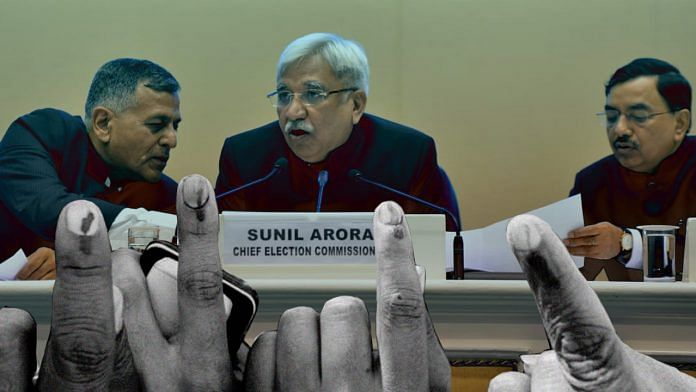Two former chief election commissioners have said that a dissenting opinion by an election commissioner must be mentioned in the poll body’s order. The Supreme Court is hearing Congress MP Sushmita Dev’s petition against the EC’s clean chits to PM Narendra Modi and BJP chief Amit Shah on complaints of model code violations. Election Commissioner Ashok Lavasa had reportedly dissented against the three-member panel’s decision.
ThePrint asks: Should EC make dissent in its decisions public or does it promote needless public scrutiny?
Whether dissent should be made public depends on the wishes of the dissenter
 S. K. Mendiratta
S. K. Mendiratta
Former legal advisor, Election Commission
When the Election Commission comes together to decide on a model code of conduct violation, plenty of views are shared. But from my experience, there is hardly any dissenting view when it comes to taking a call on MCC violations. Ultimately, either the CEC is able to convince those of a contrary viewpoint, or the other way around. More often than not, the EC reaches a consensus.
But there has been news recently of an EC having dissented in the recent clean chit that was given to PM Modi regarding his Wardha speech. I believe there are two aspects that must be carefully considered before taking a call on whether or not a dissenting view should be made public.
One, it is a matter of privacy. Often, a dissenting EC may not want to make his/her dissent public. In that case, it might just be wiser to keep the dissenting view within the four walls.
However, there might be times the dissenter feels strongly about the dissent and is staunchly against the majority decision. In that case, they might want to make it explicit that they were not party to whatever decision was made. Just like courts make the majority and dissenting view of a bench public, this option may be considered then.
Making dissenting EC view public will encourage transparency and a healthy culture of dissent
 Sushmita Dev
Sushmita Dev
Petitioner in SC against MCC violation, and Congress MP
Any authority adjudicating on a matter is required to give reasons behind its order. This is the most basic and fundamental rule of natural justice, which any authority is expected to stick to. If someone is being convicted by the court, they ought to know why, and the same holds true if they are being acquitted. If the judiciary, including the high courts and the Supreme Court, has to adhere to this rule, why is the Election Commission exempt from it?
One of the EC members gave a dissenting view in the clean chit given to PM Modi. Neither was the dissenting view made known, nor was the reason behind the EC’s final decision conveyed to the complainant. Imagine if the EC had in fact found PM Modi guilty of violating the model code of conduct – would they not have given a reasoned order then?
Elections are a time-bound exercise. The Election Commission and its decisions are relevant only for the period the elections are going on. Which is why it is important for the EC to deliver on a timely basis.
The Supreme Court is the appropriate authority to step in, which is why I filed the petition in the Supreme Court. Basic tenets of natural justice must be adhered to, and making the dissenting view public will only encourage transparency and a healthy culture of dissent.
Also read: Big split in Election Commission as EC Ashok Lavasa stands up against clean chits to Modi
Improper to change rules to make dissenting views public while elections are still on
 P.K. Malhotra
P.K. Malhotra
Former union law secretary
Decisions such as these are administrative in nature and must only be taken if they help conduct a free and fair election. Ultimately, that is the aim with which the Election Commission is required to work.
The status quo is that whatever the minority or dissenting viewpoint in the decision-making process may be, it is the majority decision that will prevail. With the election going on, one cannot expect the system to be changed because it will lead to total chaos. There are no guidelines about how dissenting views should be made public or told to the complainant, and it would be improper to introduce new rules at this point.
The existing system should be followed as it is for the remaining period of the 2019 Lok Sabha elections. One cannot change the goalpost while the game is still being played.
Having said that, such a change in the system can always be implemented post the elections for future purposes. The minority view is also important, and the public has a right to know about it. This will help enhance transparency and encourage free and fair elections. But such changes need to wait till the elections are over; in no way will their implementation make sense during the elections.
Also read: With 5 clean chits to Modi, EC made it clear: BJP Varanasi nominee is free to say anything
By not making dissenting opinion public, EC has shirked from its constitutional responsibility
 Virag Gupta
Virag Gupta
Advocate and author, “Election on the Roads”
Due to the inaction on complaints against Prime Minister Narendra Modi and BJP president Amit Shah, the Supreme Court had directed the Election Commission to pass appropriate orders within a definite timeframe. As per media reports, the Election Commission has now, in a mechanical manner, given clean chits to both Modi and Amit Shah. As per convention, the EC communicates its decision to the complainant and also publishes it on its website. EC orders are also available under the RTI Act. So why is the dissenting opinion not being made public?
In earlier matters, the dissenting opinion within the EC was made public. In the present instance, the EC has shirked from its constitutional responsibility under Article 324 of the Constitution (superintendence, direction and control of elections to be vested in an Election Commission). There is no doubt that the majority view of the EC is what will prevail. However, dissent too has been called as an appeal to the brooding spirit of the law, and is a very important part of all pronouncements.
All the authorities with the power to take action are expected to satisfy norms of fairness and pass reasoned orders. Time is of utmost essence during the elections. Accordingly, the Bombay High Court had directed social media companies to remove any objectionable content within three hours. By first delaying action and now withholding the complete order, the EC is dithering on the issue. Such actions lower the credibility of the constitutional authority.
Making dissent view public is not only in people’s interest, but also Election Commission’s
 Sanya Dhingra
Sanya Dhingra
Principal correspondent, ThePrint
No scrutiny on a constitutional body that decides on matters of public significance, let alone democratic and electoral, is needless. It appears that the question of making dissenting views from the Election Commission public is not legally settled. However, the principles of natural justice would logically require that dissent in such sensitive and crucial cases is duly recorded and made public.
It is not only in the interest of the complainant and the common public to disclose the dissenting opinion, but also in the interest of the EC, which can strengthen its image as a democratic and resilient institution capable of accommodating dissent by publicly declaring exactly how it takes crucial decisions.
It is also in the interest of the Election Commissioner who has dissented – taking enormous personal and professional risk – that his dissent is made known to the public. Whether or not one agrees with the dissenting EC, it is hard to not acknowledge that his is an act of enormous courage. It is only fair that the public knows that he dissented and the exact grounds on which he dissented. If nothing else, the public support and pressure in his favour can act as a shield for him from arbitrary and vindictive actions by those in power.
Let us not forget the dissenting election commissioner is in line to become CEC in about two years, and does not enjoy the constitutional protection from arbitrary removal at the whims of the government.
By Fatima Khan, journalist at ThePrint.




Not many Indians hear the “ eloquence of silence “ from this most august body, for several weeks tantamount to almost a neutral, caretaker government for the country. It is inconceivable for a judgment of a High Court or the Supreme Court to consist of the body of the majority view, keeping hidden from public view the fact that a minority has reached a different finding and the grounds on which it has chosen to do so. But for a leak or an intrepid journalist – certainly not an ace team that defines the new gold standard of the profession – the public would be unaware that one of the three distinguished ECs has, for good and cogent reasons, dissented from the majority. When or how it will happen is difficult to judge, but the ECI must recover its earlier elan and virtue.